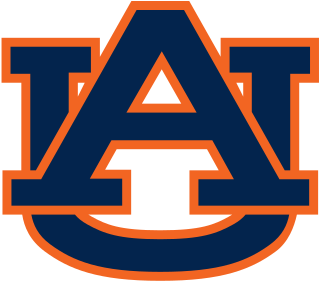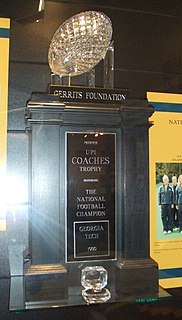
The Bowl Championship Series (BCS) was a selection system that created five bowl game match-ups involving ten of the top ranked teams in the NCAA Division I Football Bowl Subdivision (FBS) of American college football, including an opportunity for the top two teams to compete in the BCS National Championship Game. The system was in place for the 1998 through 2013 seasons and in 2014 was replaced by the College Football Playoff.

The USC Trojans football program represents University of Southern California in the sport of American football. The Trojans compete in the Football Bowl Subdivision (FBS) of the National Collegiate Athletic Association (NCAA) and the South Division of the Pac-12 Conference (Pac-12).

The BCS National Championship Game, or BCS National Championship, was a postseason college football bowl game, used to determine a national champion of the NCAA Division I Football Bowl Subdivision (FBS), first played in the 1998 college football season as one of four designated bowl games, and beginning in the 2006 season as a standalone event rotated among the host sites of the aforementioned bowls.

The Auburn Tigers football program represents Auburn University in the sport of American college football. Auburn competes in the Football Bowl Subdivision (FBS) of the National Collegiate Athletic Association (NCAA) and the Western Division of the Southeastern Conference (SEC).
The Associated Press Poll provides weekly rankings of the top 25 NCAA teams in one of three Division I college sports: football, men's basketball and women's basketball. The rankings are compiled by polling 62 sportswriters and broadcasters from across the nation. Each voter provides their own ranking of the top 25 teams, and the individual rankings are then combined to produce the national ranking by giving a team 25 points for a first place vote, 24 for a second place vote, and so on down to 1 point for a twenty-fifth place vote. Ballots of the voting members in the AP Poll are made public.
The 1998 NCAA Division I-A football season, play of college football in the United States organized by the National Collegiate Athletic Association at the Division I-A level, began in late summer 1998 and culminated with the major bowl games in early January 1999. It was the first season of the Bowl Championship Series (BCS), which saw the Tennessee Volunteers win the national championship, one year after star quarterback Peyton Manning left for the National Football League (NFL). Tennessee defeated the Florida State Seminoles, 23–16, in the Fiesta Bowl in Tempe, Arizona, to secure the inaugural BCS National Championship.

The 2002 NCAA Division I-A football season ended with a double overtime national championship game. Ohio State and Miami both came into the Fiesta Bowl undefeated. The underdog Buckeyes defeated the defending-champion Hurricanes 31–24, ending Miami's 34-game winning streak. Jim Tressel won the national championship in only his second year as head coach.

The 2003 NCAA Division I-A football season ended with an abundance of controversy, resulting in the claim of a split national championship. This was the first claimed split title since the inception of the BCS, something the BCS intended to eliminate.

The 2004 NCAA Division I-A football season was the highest level of college football competition in the United States organized by the National Collegiate Athletic Association (NCAA). The regular season began on August 28, 2004 and ended on December 4, 2004. The postseason concluded on January 4, 2005 with the Orange Bowl, which served as the season's BCS National Championship Game.
The Coaches Poll is a weekly ranking of the top 25 NCAA Division I Football Bowl Subdivision (FBS) college football, Division I college basketball, and Division I college baseball teams. The football version of the poll has been known officially as the Amway Coaches Poll since 2014.

The Alabama Crimson Tide football program represents the University of Alabama in the sport of American football. The team competes in the Football Bowl Subdivision (FBS) of the National Collegiate Athletic Association (NCAA) and the Western Division of the Southeastern Conference (SEC). The team's head coach is Nick Saban, who has led the Tide to six national championships over his tenure. The Crimson Tide is among the most storied and decorated football programs in NCAA history. Since beginning play in 1892, the program claims 18 national championships, including 13 wire-service national titles in the poll-era, and five other titles before the poll-era. From 1958 to 1982, the team was led by Hall of Fame coach Paul "Bear" Bryant, who won six national titles with the program. Despite numerous national and conference championships, it was not until 2009 that an Alabama player received a Heisman Trophy, when running back Mark Ingram became the university's first winner. In 2015, Derrick Henry became the university's second Heisman winner. The Crimson Tide won back to back Heisman trophies in 2020 and 2021, with DeVonta Smith and Bryce Young.

The Coaches' Trophy is the trophy awarded annually by the American Football Coaches Association (AFCA) to the NCAA Division I FBS college football national champion as determined by the Coaches Poll. The trophy has been presented since 1986 and was contractually given to the winner of the BCS National Championship Game and its predecessors from 1992 to 2013. It will continue to be awarded to the No. 1 ranked team in the final poll of the season.

The 2004 Auburn Tigers football team represented Auburn University in the 2004 NCAA Division I-A football season. Auburn compiled a record of 13–0, winning the Southeastern Conference championship and finishing the season ranked #2 in both the AP Poll and the Coaches' Poll. Beginning the season ranked #17 in the AP poll and #18 in the Coaches' Poll, the Tigers were denied a berth in the BCS National Championship Game because they finished the regular season ranked #3 in the BCS rankings. Head coach Tommy Tuberville, who was nearly fired after the 2003 season, was named national Coach of the Year by the Associated Press. This was Auburn's third undefeated season in which they played over ten games.
The 2004 USC Trojans football team represented the University of Southern California in the 2004 NCAA Division I-A football season. The 2004 Trojans football team won the 2004 BCS National Championship by winning the 2005 Orange Bowl, that year's BCS National Championship Game. The team also won the AP title for the second year in a row. It was the Trojans' first undisputed national championship since 1972, and the second time a team had gone wire-to-wire, with the Trojans holding the number 1 spot in the polls all season. The team was coached by Pete Carroll in his fourth year with the Trojans, and played their home games in the Los Angeles Memorial Coliseum. It is widely considered one of the greatest college football teams of all time.

The 2008 NCAA Division I FBS football season was the highest level of college football competition in the United States organized by the National Collegiate Athletic Association (NCAA).
A national championship in the highest level of college football in the United States, currently the NCAA Division I Football Bowl Subdivision (FBS), is a designation awarded annually by various organizations to their selection of the best college football team. Division I FBS football is the only National Collegiate Athletic Association (NCAA) sport for which the NCAA does not sanction a yearly championship event. As such, it is sometimes unofficially referred to as a "mythical national championship".

The 2011 Tostitos BCS National Championship Game was a college football bowl game to determine the national champion of the 2010 NCAA Division I Football Bowl Subdivision (FBS) season. The finale of the 2010–2011 Bowl Championship Series was played at the University of Phoenix Stadium, the host facility of the Fiesta Bowl in Glendale, Arizona, on January 10, 2011.

The 2010 NCAA Division I FBS football season was the highest level of college football competition in the United States organized by the National Collegiate Athletic Association (NCAA).

The 2013 NCAA Division I FBS football season was the highest level college football competition in the United States organized by the National Collegiate Athletic Association (NCAA).
The Auburn Tigers football team represents Auburn University in American football.












